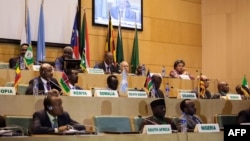A cease-fire is scheduled to go into effect on Christmas Eve in conflict-ridden South Sudan, after the country’s government and rebel groups, as well as other signatories, signed a cessation of hostilities agreement in Addis Ababa, Ethiopia late Thursday.
International Crisis Group senior analyst Casie Copeland says there was a lot of pessimism over whether the agreement would be signed, after both the government and the largest opposition group raised significant challenges to the draft.
“The government raised issues with the fact that the agreement wouldn’t have allowed them to re-arm for any other purposes, such as domestic law and order, and the opposition thought that the composition of the cease-fire monitors and the peace oversight body needed to be reviewed in light of changed situations.”
In the end, she says, the agreement incorporated provisions that satisfied both sides.
U.S. Institute of Peace visiting researcher Aly Verjee notes there have been several cease-fire agreements since early 2014. He says they generally suffer from three main challenges: commitment, verification, and the ability to de-escalate conflict.
“The most important of those problems is political commitment,” said Verjee. “Are the groups that are involved actually committed? So when they say they will immediately disengage, as is specified in this text, do they actually do that? When they say that they will notify everybody under their command of the provisions of this agreement, do they actually take that forward?”
Ahmed Soliman, a research associate for the Africa Program at Chatham House, says that for the agreement to stick, South Sudan’s neighbors must hold it accountable.
“The guarantors of this are going to be the neighbors, the IGAD countries – Uganda, Sudan, Ethiopia, Kenya, others,” says Soliman. “And without them saying that there’s a risk of punitive measures and IGAD will pursue those if the parties aren’t taking this seriously, then I see small hope for them in January when the discussions take place again, leading to positive outcomes.”
Verjee argues the success of this agreement will depend upon what happens next.
“If everybody goes home or goes off for the holidays and in two weeks or three weeks, or a month’s time, something hasn’t really returned, then we’re not really going to see progress moving forward. It’s very difficult to generate momentum once you’ve come to a stop.”
Tens of thousands of people have been killed in South Sudan and more than 2 million people have fled the country since the conflict broke out in December 2013.




